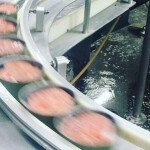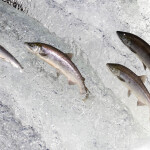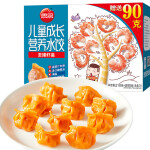Loran co-founders José Lorenzo and Andrés Almada said the company, alongside the shrimp farmers with whom it partners, is looking to enter the U.S. marke after recent developments have made it a conducive time to attempt market penetration.
Loran, a Sonora, Mexico-based fishmeal and fish oil producer, commercializes animal feed products – from raw materials to finished products – including aqua pellet, pet food, fishmeal, fish oil, and grains and their byproducts. It currently has annual turnover of some USD 22 million (EUR 20.6 million), focusing mainly on the Mexican market with a smaller focus on exports to Chile.
The company is just beginning to export to the U.S. and Canada, too, Lorenzo told SeafoodSource.
“Due to our operation and market focus, we’re looking to add farmed shrimp to our range of products. We have experience working with this product – from harvesting to packaging, cold management, and inventories – and we see a good opportunity in exporting [shrimp] to North America since the certified producers are our own clients and business partners,” he said. “We have a good competitive advantage thanks to our geographical position. I understand that competition from countries like Ecuador and India is very strong, but if the U.S. applies duties, there is a good possibility for us.”
The U.S. Department of Commerce (DOC) leveled countervailing duties in March against shrimp from Ecuador, India, and Vietnam.
Ecuador was hit with the highest rate of the three countries and was facing a 7.55 percent countervailing duty on all shrimp exports to the U.S.; Ecuadorian shrimp company Santa Priscila in particular was given a 13.41 percent rate, while the Sociedad Nacional de Galapagos (SONGA) was penalized at a rate of 1.69 percent.
In a recent update, the DOC significantly reduced these duties and, in some cases, removed them entirely. Even though the duties have been lowered, Loran is hoping any duties at all will lead to less competition from larger shrimp-producing nations.
In Mexico, besides supplying aquaculture farms directly, Loran also supplies large agro-industrial firms such as Cargill and Nutec with raw materials and then distributes finished feed from those firms to shrimp farmers.
While it is impossible to compete with large firms in terms of financing and lines of credit, Loran’s added value, according to Lorenzo, is in partnering with the local producers to find new markets, getting better prices for shrimp on the market, and driving shrimp exports.
The ideal collaborators, according to the company, are Mexican farmers who are existing customers and whose operations already have Best Aquaculture Practices (BAP) certification.
“We can sell the feed to the shrimp farmer, but that farmer is in a difficult moment; they can try to sell shrimp in the domestic market, or they go through many different middlemen for the shrimp to get to the end consumer, which really affects prices,” Lorenzo said.
To alleviate some of the issues present in the Mexican shrimp industry, Lorenzo believes the sector can look toward produce – an industry in which the executive formerly worked.
“In produce, the relationship between the U.S. and Mexico is totally different: it is very organized and transparent. The brokers in the U.S. work very well in communications, there is transparency, and it is very structured,” he said. “That doesn’t happen with shrimp, so we’re looking to help out the shrimp farmers in placing their product and making this a more transparent business, helping the farmer to grow and gain economic stability. In that way, they can expand the business and purchase better-quality feed, which is what we provide.”
The Loran executives are working on systems to establish traceability along the entire production and value chain, allowing consumers to utilize price look-up codes (PLUs) and bar codes to guarantee transparency and traceability.
Though Loran is gaining momentum, there are still hurdles …








